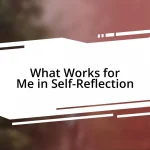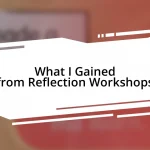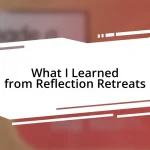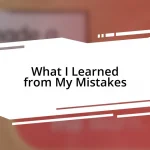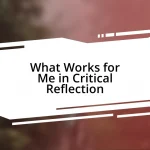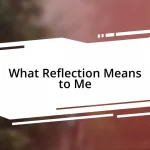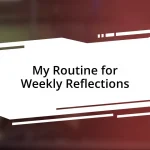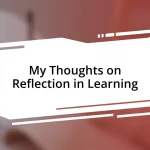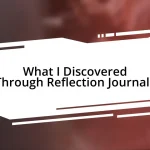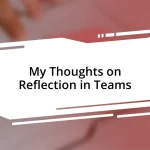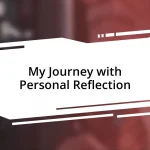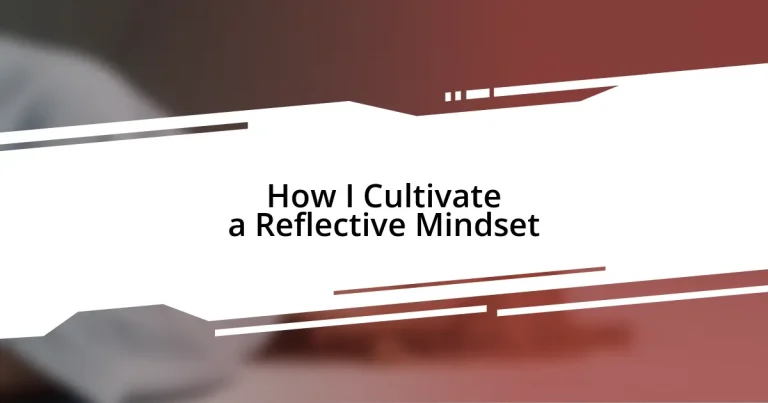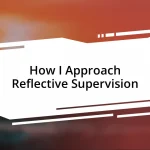Key takeaways:
- A reflective mindset involves introspection, promoting self-awareness and informed decision-making by analyzing one’s thoughts, feelings, and actions.
- Benefits of reflection include enhanced emotional intelligence, continuous learning, and improved problem-solving skills.
- Practical techniques for reflection are journaling, mindfulness meditation, and discussing experiences with others to gain new insights.
- Establishing a consistent reflection routine and creating a conducive environment are crucial for effective reflection and overcoming barriers to the practice.
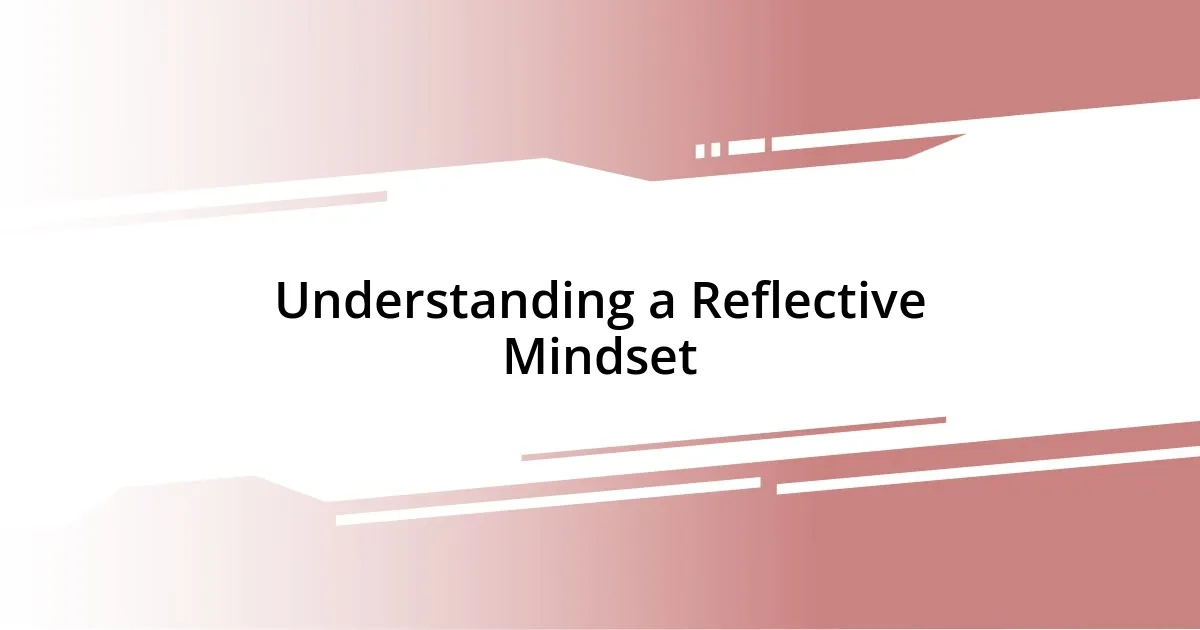
Understanding a Reflective Mindset
A reflective mindset is all about turning inwards, taking a step back to analyze our thoughts, feelings, and actions. I remember a time when I faced a challenging decision at work. Instead of rushing in, I sat quietly and considered not just the pros and cons, but my emotional response to each option. This moment of pause allowed me to connect deeply with my values and make a choice that felt truly right for me.
Have you ever noticed how easy it is to get swept away in the hustle of daily life? When I force myself to slow down and reflect, it’s like shining a light into the corners of my mind where clarity often lies. I’ve found that asking myself questions like, “How did this experience affect me?” or “What can I learn from this situation?” uncovers insights that are often hidden beneath the surface. The beauty is in realizing how these reflections can shape my future actions and choices.
Reflecting isn’t just about looking back; it’s a tool for growth. For instance, after a difficult conversation, I take time to dissect what happened. I think about what triggered my emotions and how I responded. This kind of practice not only enriches my understanding of myself but also enhances my interactions with others. Isn’t it fascinating how a simple moment of reflection can transform a seemingly routine experience into a valuable learning opportunity?
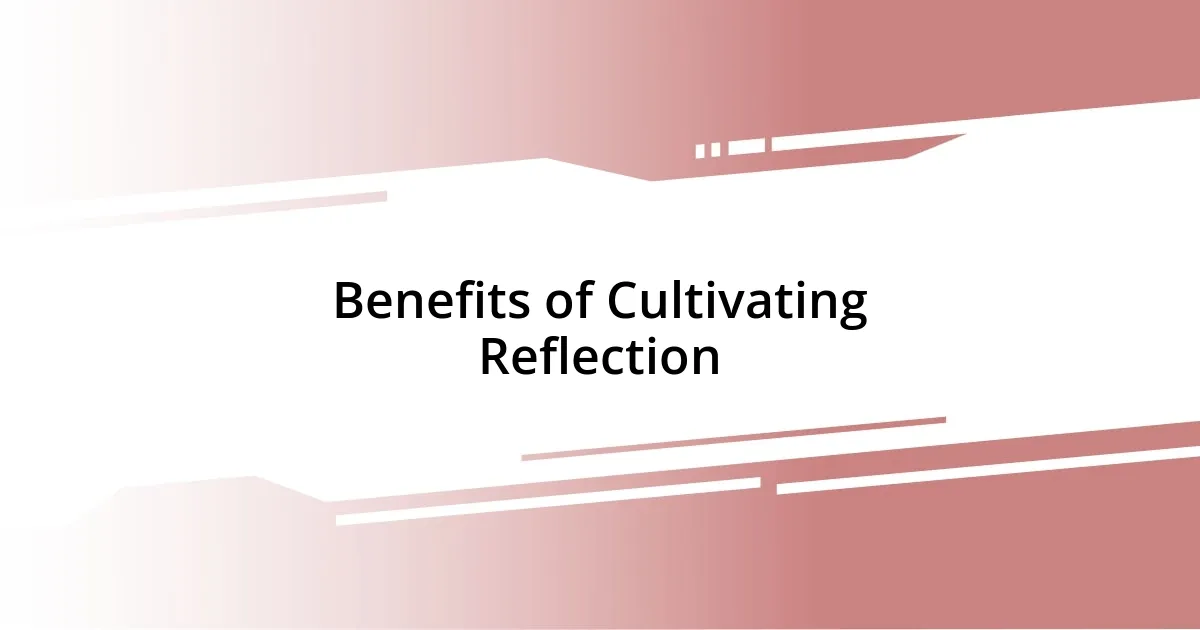
Benefits of Cultivating Reflection
Cultivating a reflective mindset brings numerous benefits that can significantly enhance our personal and professional lives. One of the most profound advantages I’ve experienced is increased self-awareness. When I take the time to reflect, I often stumble upon realizations about my behaviors and patterns that I may not have noticed otherwise. For example, during a particularly stressful project, I discovered that I tend to become overly critical of myself. Acknowledging that allowed me to approach challenges with more compassion in the future, leading to improved self-esteem and resilience.
Here are some key benefits of cultivating reflection:
– Enhanced Self-Awareness: Understanding your own emotions and reactions provides a clearer picture of how you function.
– Better Decision-Making: Reflection helps sort through options and aligns decisions with personal values and goals.
– Emotional Intelligence Growth: Analyzing past experiences promotes empathy and connection with others.
– Continuous Learning: Every reflection is a chance to learn from experiences which enriches personal growth.
– Improved Problem-Solving Skills: Taking time to reflect on challenges often leads to innovative solutions that wouldn’t have surfaced in the heat of the moment.
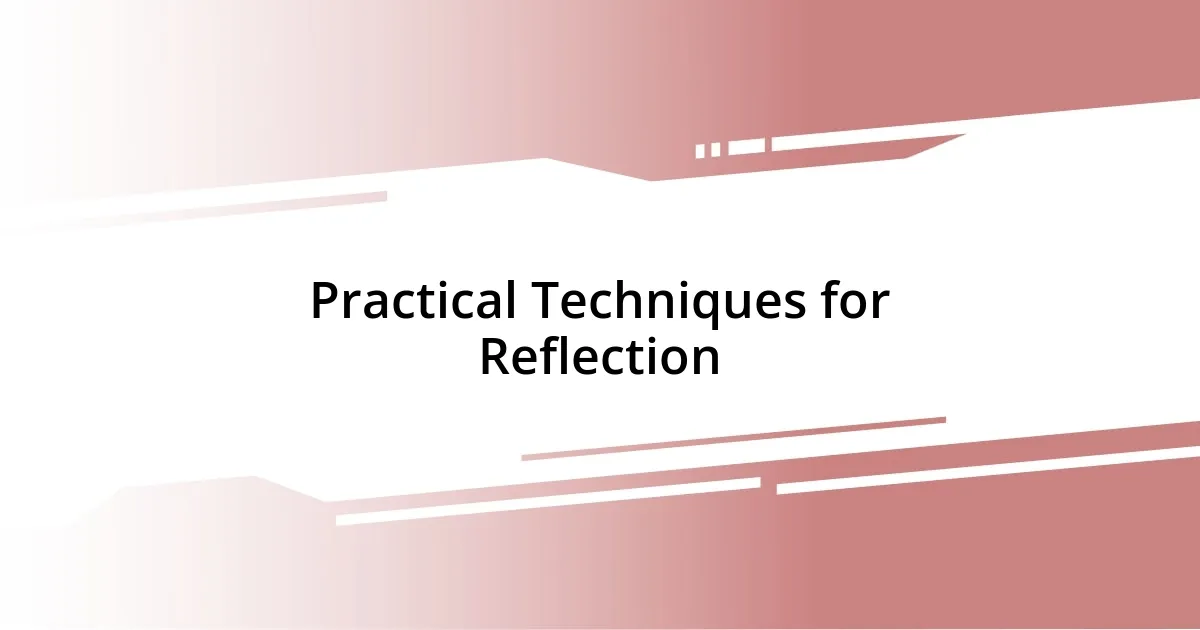
Practical Techniques for Reflection
Reflective journaling is one of my go-to techniques for fostering a mindset of contemplation. I typically choose a quiet evening to write down my thoughts, feelings, and any incidents that stood out during the day. This practice not only helps me organize my thoughts but often leads to unexpected insights, like the realization that a colleague’s feedback impacted my self-perception more than I initially acknowledged.
Another powerful method I embrace is mindfulness meditation. By dedicating just a few minutes each day to focus on my breath and observe my thoughts without judgment, I find clarity in chaotic moments. For instance, after a heated discussion, a mindful pause lets me process my emotions and consider how I’d like to respond instead of reacting impulsively. This pause can shift my entire outlook, allowing me to approach situations with greater calm and perspective.
Lastly, discussing experiences with a trusted friend or mentor can be incredibly enriching. I vividly recall a time when I grappled with a tough personal decision; sharing my thoughts brought forth ideas I hadn’t considered. These conversations can reveal blind spots in our thinking and help us see different angles of a situation. I genuinely believe that reflection, whether through journaling, meditation, or dialogue, provides us with the tools to navigate life more thoughtfully.
| Technique | Description |
|---|---|
| Reflective Journaling | Writing thoughts and feelings to uncover insights and patterns. |
| Mindfulness Meditation | Practicing focus on the present moment to gain clarity on emotions and reactions. |
| Discussion with Others | Engaging in conversations to gain different perspectives and ideas. |
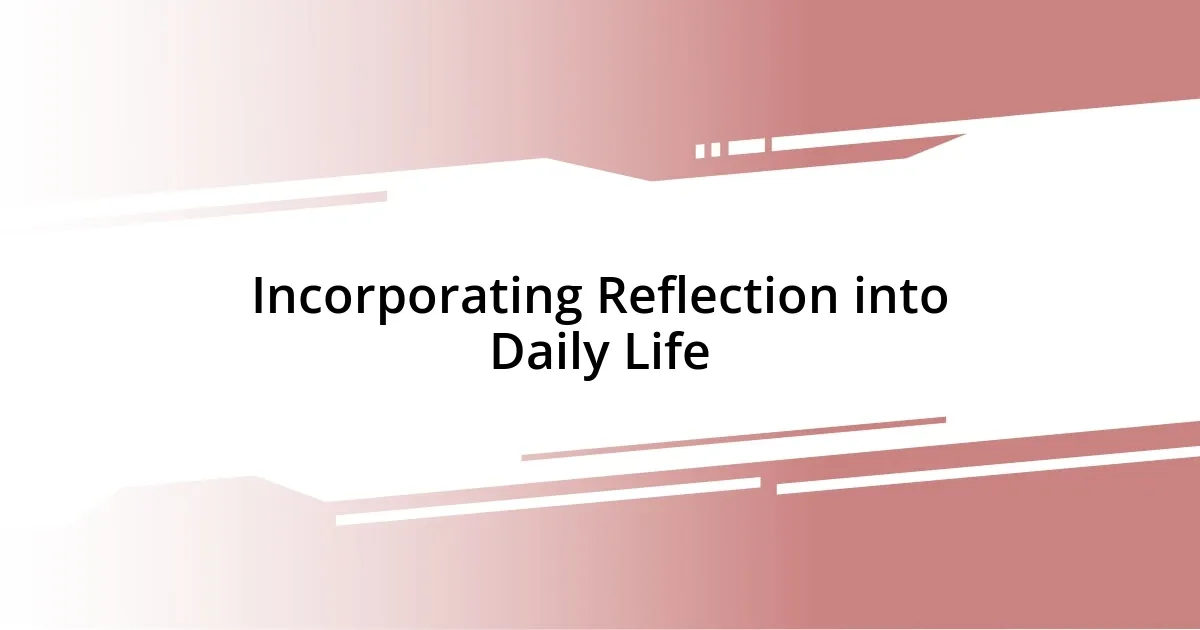
Incorporating Reflection into Daily Life
Incorporating reflection into daily life is often easier than it seems. For me, the simple act of pausing for a moment during my routine can make a world of difference. I like to take a few minutes after lunch to go for a short walk, allowing my mind to mull over my morning activities. This practice not only energizes me physically but also gives me the clarity to evaluate the interactions I had or the tasks I tackled, leading me to insights that shift my entire approach to the rest of the day.
Another technique that has enriched my reflective journey is integrating questions into my evenings. I set aside a few minutes before bed to ask myself, “What went well today?” or “What could I have done differently?” This nightly check-in creates a space for gratitude and growth. I remember one evening, I reflected on a challenging meeting at work. By documenting my feelings about it, I recognized how my initial frustration stemmed from my high expectations rather than from my colleagues’ input. This realization helped me adjust my expectations moving forward, making future collaborations smoother.
When it comes to reflection, I’ve found the power of sharing experiences with my partner invaluable. We routinely have a “debrief” after our days. I recall one time, I was deeply stressed about an upcoming presentation. As I verbalized my worries, my partner reminded me of times when my prep had less to do with nerves and more with embracing the moment. That perspective shift allowed me to come into the presentation with a calm mindset. Engaging in this dialogue not only deepens my understanding of my own thoughts but also strengthens our connection. Isn’t it fascinating how discussing our experiences can illuminate aspects we never realized?
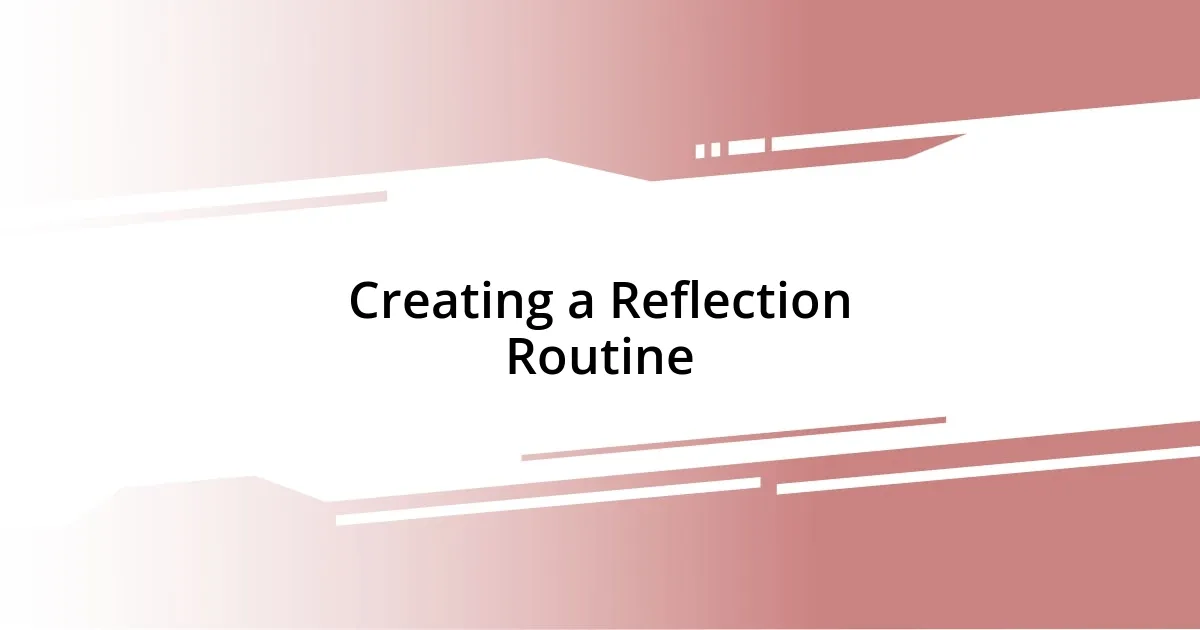
Creating a Reflection Routine
Creating a reflection routine is all about consistency and intentionality. I’ve found that setting a specific time each day for reflection really helps. For instance, I love taking a moment in the morning with my coffee. I often ask myself, “What am I looking forward to today?” This simple question not only sets a positive tone but also primes my mind to seek meaningful experiences throughout the day.
Another aspect I embrace in my routine is using prompts to guide my reflections. I keep a list of thought-provoking questions handy, like “What challenged me today?” or “What did I learn?” Recently, I came across an old journal entry where I had penned down my thoughts after a difficult meeting. Reading those reflections helped me see my growth over time and reminded me how far I’ve come, reinforcing my commitment to this practice.
Finally, I can’t stress enough how crucial it is to create a comfortable space for reflection. I’ve converted a corner of my living room into a cozy nook with soft pillows and warm lighting. It’s my go-to spot when I feel overwhelmed and need to sort out my thoughts. Sitting there, I sometimes close my eyes and take deep breaths—doesn’t it feel refreshing to have a designated space to just be with your thoughts? This little sanctuary helps me ground myself, making the routine not only effective but genuinely enjoyable.
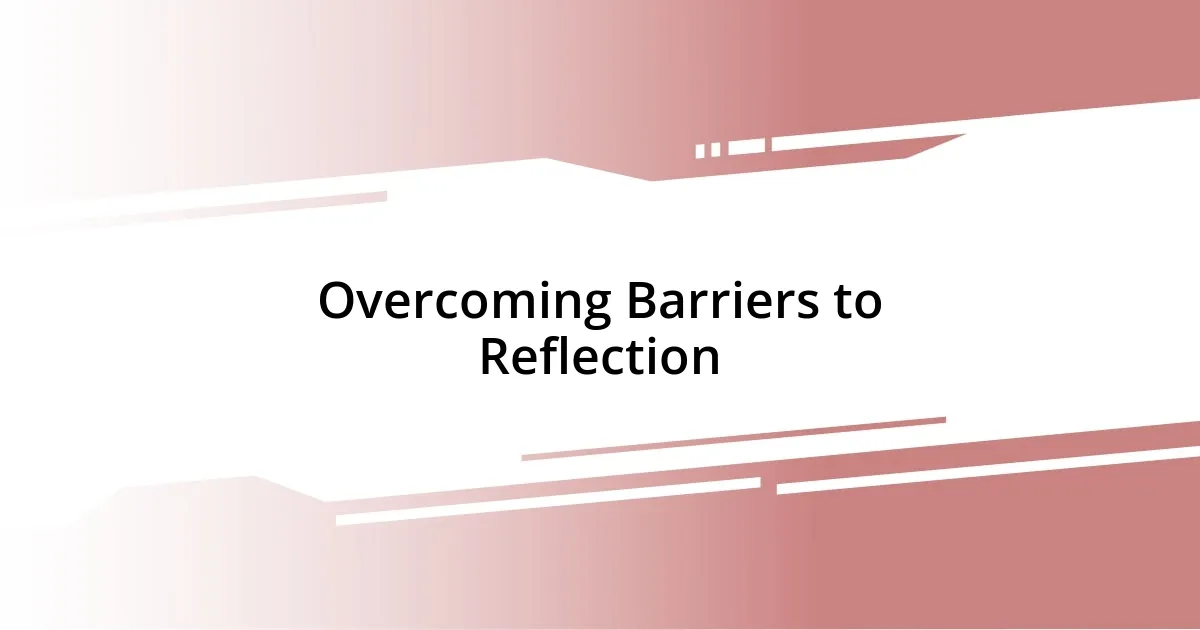
Overcoming Barriers to Reflection
Overcoming barriers to reflection can often feel like scaling a mountain. One substantial hurdle I’ve encountered is the feeling of being too busy to pause and reflect. I remember a particularly hectic week at work; I felt like I was drowning in deadlines and didn’t have a second to spare. However, I realized that carving out just five minutes to gather my thoughts amid rush hour not only eased my stress but offered clarity to prioritize my tasks. Isn’t it amazing how brief moments of stillness can reshape our perspectives?
Another significant barrier I’ve faced is the fear of vulnerability that comes with honest self-reflection. In my earlier experiences, I used to shy away from confronting my mistakes because it felt uncomfortable. One day, driven by an urge to grow, I sat down and really confronted a miscommunication I had with a colleague. To my surprise, acknowledging my part in the misunderstanding opened the door to a heartfelt conversation. This shared honesty not only repaired our relationship but also gave me a renewed sense of confidence to face similar challenges. Have you ever felt that apprehension, only to discover hidden strengths when you push through?
Lastly, I’ve noticed that sometimes the physical environment plays a significant role in fostering reflection. At one point, I was trying to reflect in my chaotic workspace, filled with distractions screaming for attention. I decided to try reflecting outdoors instead. One sunny afternoon, while sitting on a park bench, I found it much easier to disconnect from my worries. The fresh air and natural surroundings cleared my mind and allowed my thoughts to flow freely, revealing insights I hadn’t accessed before. Have you considered how changing your surroundings might lead to breakthroughs in your thought processes?
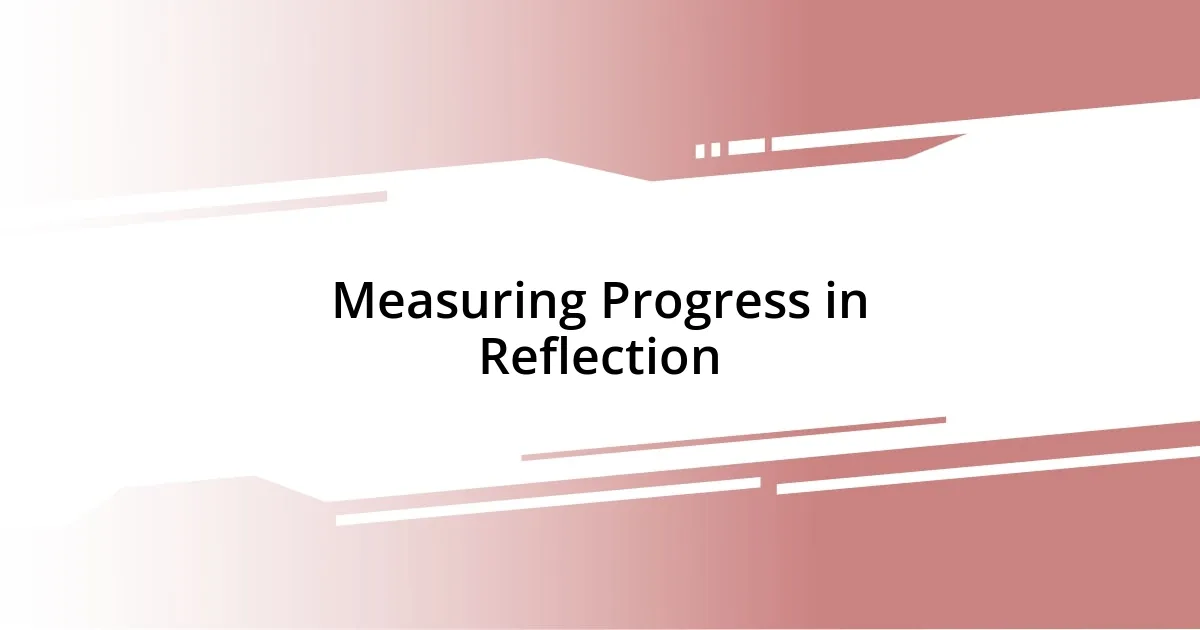
Measuring Progress in Reflection
To truly measure progress in reflection, I track my thoughts and feelings over time. I started keeping a dedicated reflection journal where I jot down more than just daily events; I capture my emotional responses and insights. Looking back at previous entries, sometimes I’m amazed at the emotional storms I thought were insurmountable. It’s rewarding to see how I’ve navigated through those moments and gained a deeper understanding of myself.
Another method I’ve found effective is revisiting my reflection prompts periodically. I have a penchant for revisiting questions like, “What inspires me?” or “What fears hold me back?” These inquiries allow me to gauge how my answers evolve. The last time I reflected on my fears, I realized that something I once saw as a significant obstacle now felt manageable. Could this change in perspective signal growth? For me, it indicates a shift in self-awareness and confidence that truly marks progress.
Sometimes, I measure my progress through conversations with close friends. I’ve had friends share their perspectives on my growth by recalling moments when I seemed stuck, only to see me flourishing now. Those external reflections can be transformative. When someone points out my positive changes, it ignites a warmth in me—a reminder that even on days where I feel stagnant, progress is often happening in subtle, invisible ways. Have you ever had someone help you see your growth from a different lens? It’s a beautiful revelation when others highlight our development and remind us how far we’ve come.

